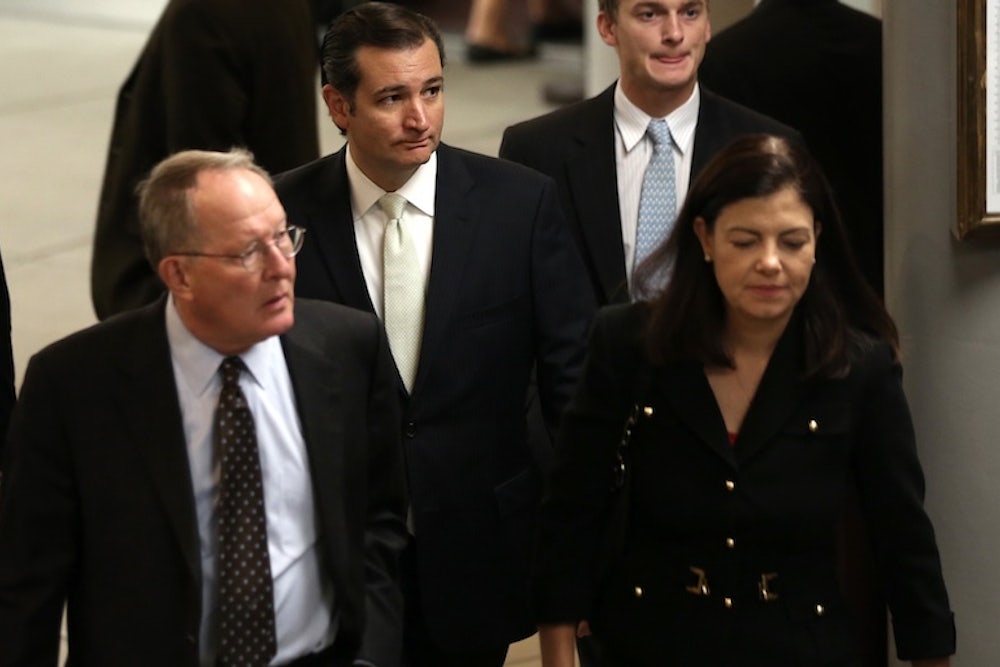The story most Democrats and progressives have long told about the GOP is that it’s a party that has been captured by its right wing. It’s a fairly simple story to tell. You find a firebrand character who is not especially popular, such as Newt Gingrich, and present him as the face of the party. Or you take a kooky GOP Senate candidate with views on abortion that even many pro-lifers find appalling, point to him and say, “Represent.” The idea is to persuade the persuadable that the “real” GOP is so far out of the mainstream that it cannot be trusted.
This would be a good political tactic even if it were made of whole cloth. But, of course, it isn’t. The GOP is indeed a more uniformly conservative party now than it has ever been, just as the Democratic Party is more uniformly liberal.
But a funny thing happened in the course of the government shutdown. A new story line has taken hold among Democrats and progressives. It’s that the GOP is bitterly divided, and that “a minority of a minority,” namely the Tea Party faction in the House and Ted Cruz, Ted Cruz, and Ted Cruz in the Senate, are trying to use illegitimate political means to foist their policy preferences on everybody else.
Now, let us stipulate that the government shutdown, however long-lived its repercussions turn out to be, was a Republican political failure on a truly grand scale. Moreover, the agents provocateurs were indeed the Tea Party darlings of the House and Senate, all of whom were happy to let the government close shop in their tilt against the Obamacare windmill, and some of whom may well have been willing to risk sovereign default to get their way (but most of whom would certainly have known that the political process was likely to spare them any consequences for their posturing to that effect).
Nevertheless, the new line among Democrats and progressives is actually a net positive for the GOP and the best thing (in fact, the only good thing) that has happened to the party over the past couple weeks. Because the Republican Party truly is divided now—between a majority that is as staunchly conservative as ever and a minority that is not merely staunchly conservative but manifestly radical in its aims and tactics. It does not hurt, but rather has the potential to help Republicans, for their opponents to acknowledge the division within the party and the status of the Tea Party faction as a very vocal minority.
The Tea Party faction is telling its own version of the same story, namely, that it fought the good fight and lost. But that’s another way of saying that the Tea Party does not have the political power within the GOP to prevail. Yes, it can create circumstances in which the government shuts down. But it cannot prevent the government from reopening, let alone an increase in the debt limit when the alternative is default or massive spending cuts, in an effort to get its way. To the extent that its members thought they could prevail in such a showdown, they were mistaken.
If the GOP House leadership were truly under the thumb of its most radical members, there would have been no House vote on the Senate compromise bill, the government shutdown would have continued, and the Treasury would today be coping with the worst financial crisis in the history of the Republic. Of course, Democrats and progressives were issuing warnings about precisely that outcome. But it didn’t happen. And the reason it didn’t is that the GOP, though it includes a radical wing, is not a radical monolith, and its non-radical leadership has the power to defeat the radical wing when push comes to shove. To the extent the GOP’s internal struggle is understood as a contest between conservatives and radicals, in which the conservatives prevail, it will likely help the party regain some of the ground it has been losing at the center.
Of course, in order for that to happen, the conservatives have to defeat the radicals. If the Tea Party faction managed to pull off in 2016 what it failed to pull off in 2012, namely nominate one of its own for president, we would quickly and rightly be back to the story about the party’s capture by its extreme elements. Likewise, if the GOP keeps its House majority in 2014 and elects a speaker actually willing and able to deploy such radical means as forcing a default crisis.
But at present, neither a Tea Party speaker nor a Tea Party presidential nominee seems a likely element of the Republican future. And the actions on the part of party leaders (aka “the Establishment”) in preventing these outcomes will redound to their credit and the credit of the party. To the extent that mainstream Republican conservatism runs to the right of the median voter’s preferences, there is potentially much to gain in shaping the political terrain from defeating a faction everyone acknowledges is even farther to the right.
There has long been extensive hand-wringing within the GOP about the party’s need to overcome its internal divisions. On the contrary, so long as the Tea Party is losing, division might be just what the GOP needs.
